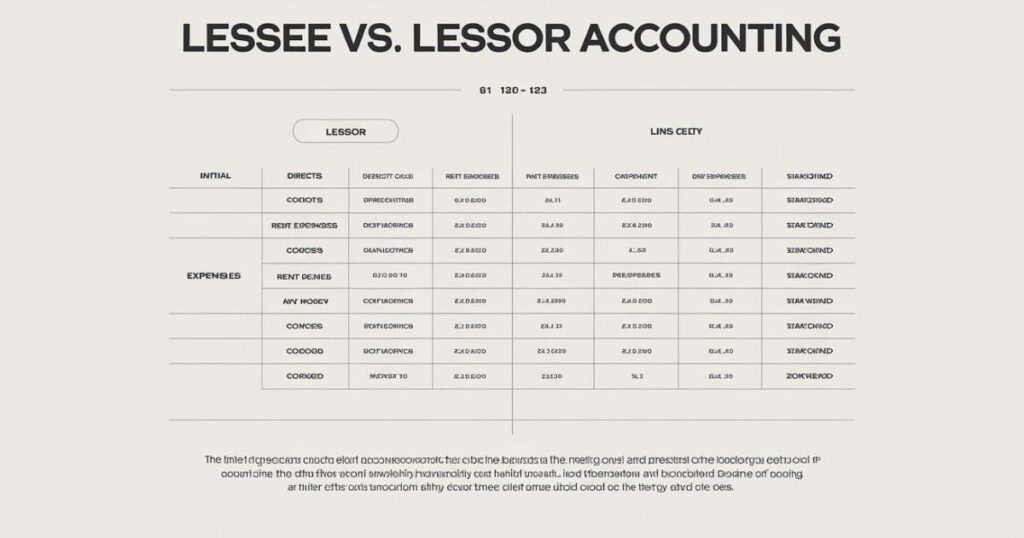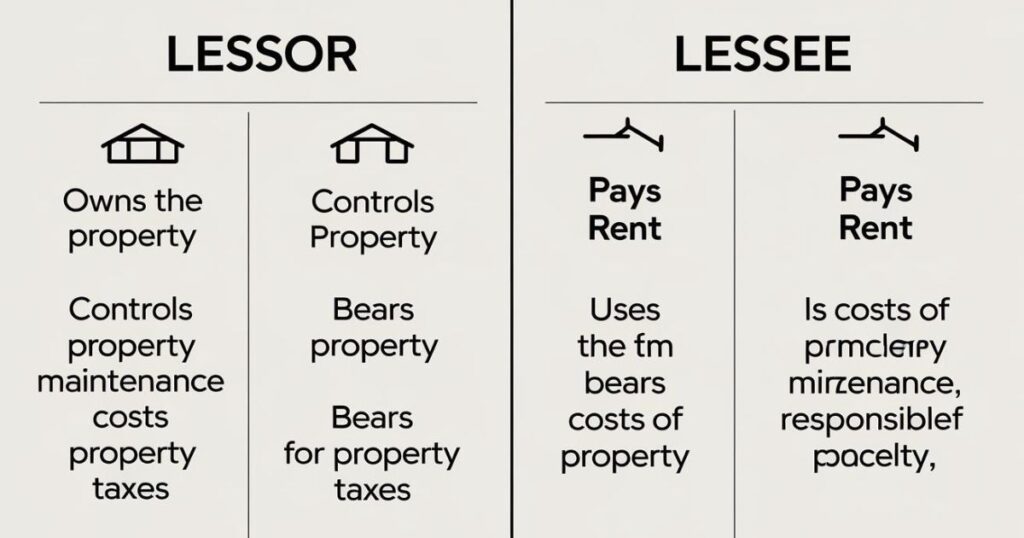Lessors own things. Lessees use those things for a while. It’s like a landlord renting an apartment to a tenant. The landlord is the lessor, and the tenant is the lessee.
Ever been confused by rental agreements? Don’t worry, you’re not alone. Whether it’s for a home or a car, knowing who’s who makes things clearer. It helps you understand your rights and duties.
Lessors and lessees have different roles. Lessors provide the item and often take care of big repairs. Lessees get to use the item and pay for it. This setup affects how money is handled and reported in business and personal matters.
What’s the Difference Between a Lessee vs. Lessor?
At its core, the distinction between a lessor and a lessee boils down to who owns the asset and who’s using it. A lessor is the owner of the property or asset being leased out. They’re the ones with the legal right to grant someone else the use of that asset for a specified period. Think of them as the big cheese in the world of leasing – they call the shots on the terms of the lease agreement and collect the lease payments.
On the flip side, we have the lessee. This is the party that’s granted the right to use the asset owned by the lessor. They’re the ones signing on the dotted line, agreeing to make regular lease payments in exchange for the use of the property or equipment.
It’s a bit like being handed the keys to a shiny new car – you get to drive it, but you don’t own it. The lessee enjoys the benefits of using the asset without the burden of ownership, but they also have to stick to the terms laid out in the lease agreement.
Is a Lessee a Tenant or Landlord?
Now, here’s where things can get a bit fuzzy for some folks. Is a lessee the same as a tenant? Well, yes and no. In the world of real estate, these terms are often used interchangeably, but there’s a subtle difference. A tenant is specifically someone who rents and occupies a property, while a lessee is a broader term that can apply to any type of lease agreement, not just real estate.
For example, if you’re renting an apartment, you’re both a tenant and a lessee. But if you’re leasing a piece of heavy machinery for your construction business, you’re a lessee but not a tenant. The key takeaway? All tenants are lessees, but not all lessees are tenants.
It’s a bit like how all squares are rectangles, but not all rectangles are squares. The landlord, on the other hand, is always the lessor – they’re the ones who own the property and are letting you use it.
Lessee vs. Lessor Accounting

ASC 842
When it comes to the nitty-gritty of accounting, things can get a bit more complex. ASC 842, or Accounting Standards Codification 842, is a set of lease accounting standards that have shaken up how businesses handle their leases on the books.
Under ASC 842, both lessees and lessors need to recognize most leases on their balance sheets. For lessees, this means recording a right-of-use asset and a lease liability for almost all leases. It’s a big change that aims to provide more transparency in financial reporting.
READ MORE: Times Interest Earned Ratio: Why It Matters in Business Finance
IFRS 16
Crossing borders, we encounter IFRS 16, the International Financial Reporting Standard that deals with leases. Similar to ASC 842, IFRS 16 requires lessees to recognize most leases on their balance sheets. There are some key differences in how certain leases are classified and measured. For companies operating globally, understanding these nuances is crucial to ensure compliance with both standards.
GASB 87
For our friends in the government sector, GASB 87 is the guideline to follow. The Governmental Accounting Standards Board Statement 87 applies to state and local governments, bringing their lease accounting practices more in line with those in the private sector. It requires governments to recognize certain lease assets and liabilities for leases that were previously classified as operating leases.
Why Software Is the Best Option for Lessee vs. Lessor Accounting
Efficient
In today’s fast-paced business world, efficiency is key. Lease accounting software swoops in like a superhero, saving the day (and countless hours) for both lessees and lessors. These digital tools automate complex calculations, track lease payments, and generate reports at the click of a button. It’s like having a team of accountants working round the clock, without the need for coffee breaks!
Easy To Use
Gone are the days of intimidating spreadsheets and cryptic formulas. Modern lease accounting software is designed with user-friendliness in mind. With intuitive interfaces and step-by-step guides, even those who break out in a cold sweat at the mention of accounting can navigate these systems with ease. It’s like having a friendly GPS for your lease accounting journey – no wrong turns, just smooth sailing.
Customizable
Every business is unique, and so are its leasing needs. That’s where the magic of customization comes in. Lease accounting software can be tailored to fit the specific requirements of different industries and lease types. Whether you’re dealing with real estate leases, equipment leases, or a mix of both, these flexible tools can adapt to your needs. It’s like having a Swiss Army knife for lease management – versatile and always ready for action.
Secure
In an age where data breaches make headlines, security is paramount. Lease accounting software offers robust protection for sensitive financial information. With features like encrypted data storage, secure access controls, and regular backups, these systems keep your lease data fort knox-level safe. It’s like having a digital bodyguard for your lease information – always vigilant, never sleeping.
Developed By Experts

Behind every great lease accounting software is a team of experts who eat, sleep, and breathe lease accounting standards. These brainiacs stay on top of the latest changes in regulations like ASC 842, IFRS 16, and GASB 87, ensuring that the software is always up-to-date. It’s like having a direct line to the accounting gurus, without the hefty consulting fees.
Frequently Asked Questions
What’s the Difference Between a Lessee vs. Lessor?
A lessor owns the asset and leases it to the lessee, who uses the asset but doesn’t own it. The lessor collects lease payments, while the lessee pays to use the asset.
Is a Lessee a Tenant or Landlord?
A lessee is typically a tenant in real estate. A landlord is always the lessor, the property owner who leases it out.
What Are the Rights of a Lessee?
A lessee has the right to use the leased asset, enjoy it without disturbance, and may be allowed to sublease it, depending on the lease agreement.
What Is the Difference Between a Renter and a Lessee?
A renter usually refers to someone leasing residential property. A lessee is a formal term that can apply to any type of asset lease.
What Does Lessee Mean in Law?
Legally, a lessee is the party that gains the right to use an asset owned by the lessor in exchange for payments under a lease agreement.
Is the Lessee the Owner of an Asset?
No, the lessee only has the right to use the asset. The lessor retains ownership throughout the lease term.
conclusion
Understanding the roles of lessor and lessee is crucial in navigating the world of leases, whether you’re dealing with real estate, equipment, or other assets. From the basic distinctions to the complexities of accounting standards, having a firm grasp on these concepts can save you from headaches down the road.
And with the help of modern lease accounting software, managing these relationships has never been easier. So next time you’re faced with a lease agreement, you’ll be ready to tackle it with confidence.

Howdy, editor at FinanceEon.com, brings over a decade of financial journalism experience. He ensures accuracy and insightful analysis, guiding a team on market trends and investment strategies.







